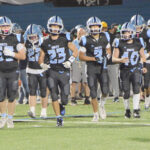Mountaineers to create consistency through reps
MORGANTOWN — West Virginia lost to UCF 45-13. Rich Rodriguez said WVU was at rock bottom. It made sense since UCF was also winless in the Big 12 and was trying to reach mediocracy. A week later, WVU didn’t win against TCU, but at least the game was closer, and if the ball bounced WVU’s way, it could’ve maybe won. It was two entirely different efforts.
Rodriguez talked after the UCF loss about how the culture and effort aren’t where he wanted them to be. He thought it was there after the Pitt win, but he was mistaken. The effort has been consistent this season.
Rodriguez is frustrated because the team’s been working on it since Day 1 of fall camp back last July.
“No matter what happens, whatever situation, we are going to play hard, play smart,” Rodriguez said. “For the most part, I think we have. If there’s one time a guy is not playing as hard as he can possibly play, that’s one time way too many. It shouldn’t take this long to do that, but maybe it does.”
Practice reps help with consistency. However, there have been some issues with getting consistent reps for WVU this season. Half of the team didn’t start practicing until fall camp, and once they were there, WVU has had multiple injuries. Players are coming in and out.
Defensive coordinator Zac Alley said reps are a “big deal.”
“For the first time, at least, I felt like this week, there was comfort in the calls like, ‘Oh, okay, this is the same,'” Alley said. “Though it has been like that, it doesn’t necessarily get seen until it’s been repped enough times for the guy to understand the things we’re doing. I think that’s helped the guys, just the consistency of the reps. We’re four, five, seven weeks of doing it and seeing it in games, and that kind of showed up, I believe.”
Reps make it easier on the players, but how do you motivate the players to give it their all during a rep? The most basic way is to give a player more playing time. Everyone who gets into football at first wants to play.
The effort on the field wins playing time.
“I think everybody either earns the right to play or doesn’t,” Alley said. “Sometimes that means a guy is a starter who plays every snap. Sometimes his backup is really good. They go 50/50, and they play the game that week that way, and that’s just how we’ve always done things.”
There’s a new incentive, though, to play hard: Money. Players are now allowed to be directly paid by universities, and there’s NIL money. Players are paid for performance.
This year, money’s already made its impact on a player’s willingness to play. Tennessee quarterback Nico Iamaleava sat out of the spring game, demanding more NIL money. He wasn’t given the money, so he transferred to UCLA.
Through the small sample size of WVU players that met with the media on Tuesday, none of them said money was a driving force to play harder.
“Not to me,” tight end Grayson Barnes said. “I’ve just been playing tackle football since I was six years old. Almost every time I run out on the field, I almost get tears in my eyes. Money can’t do that to you. It’s the game, it’s the sport. It’s what I fell in love with.”
Rodriguez has always said that if money is the driving factor, then West Virginia isn’t he place for them. So, that means playing time needs to be what drives players.
Rodriguez has already benched players who weren’t showing effort and giving the backups a chance to show it. Maybe that’s what made WVU more competitive against TCU. Now, the question is whether it’s carried over to Houston.
“We’re going to continue to do that until that culture is a given, and people say it’s harder nowadays with the transfer portal and all that,” Rodriguez said. “That’s probably true, but it still can be done, and I won’t stop preaching it and coaching it until it does happen… I’m totally obsessed with every guy playing as hard as they can. Totally obsessed. That’s the No. 1 thing from a coaching standpoint.”



